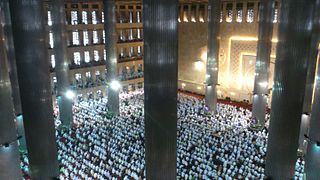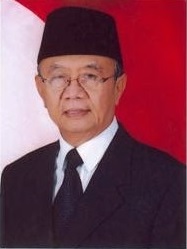Related Research Articles

Abdurrahman Wahid, though more colloquially known as Gus Dur, was an Indonesian politician and Islamic religious leader who served as the 4th President of Indonesia, from his election in 1999 until his removal from power in 2001. A long time leader within the Nahdlatul Ulama organization, he was the founder of the National Awakening Party (PKB). He was the son of Minister of Religious Affairs Wahid Hasyim, and the grandson of Nahdatul Ulama founder Hasyim Asy'ari.

Presidential elections were held in Indonesia on 5 July 2004, with a second round on 20 September. They were the first direct presidential elections in the country; prior to a 2002 amendment to the Constitution of Indonesia, the President and Vice President had been elected by the People's Consultative Assembly (MPR).

Nahdlatul Ulama is an Islamic organization in Indonesia. Its membership estimates range from 40 million (2013) to over 90 million (2019), making it the largest Islamic organization in the world. NU also is a charitable body funding schools and hospitals as well as organizing communities to help alleviate poverty.

Islam is the largest religion in Indonesia, with 86.7% of the Indonesian population identifying themselves as Muslim in a 2018 survey. Indonesia is the most populous Muslim-majority country, with approximately 231 million adherents.

Jaringan Islam Liberal(JIL) or the Liberal Islam Network is a loose forum for discussing and disseminating the concept of Islamic liberalism in Indonesia. One reason for its establishment is to counter the growing influence and activism of militant and Islamic extremism in Indonesia. The "official" description of JIL is "a community which is studying and bringing forth a discourse on Islamic vision that is tolerant, open and supportive for the strengthening of Indonesian democratization."

Nurcholish Madjid, in Indonesia affectionately known as Cak Nur, was a prominent Indonesian Muslim intellectual. Early in his academic career, Nurcholish was a leader in various student organizations. He soon became well known as a proponent for modernization within Islam. Throughout his career he continued to argue that for Islam to be victorious in the global struggle of ideas, it needs to embrace the concepts of tolerance, democracy and pluralism.

Muhammadiyah ; also known as the Muhammadiyah Society is a major Islamic non-governmental organization in Indonesia. The organization was founded in 1912 by Ahmad Dahlan in the city of Yogyakarta as a reformist socioreligious movement, advocating ijtihad - individual interpretation of Qur'an and Sunnah, as opposed to Taqlid - conformity to the traditional interpretations propounded by the ulama. It played an important role in the expansion of Salafism in Indonesia. Since its establishment, Muhammadiyah has adopted a reformist platform mixing religious and secular education, primarily as a way to promote the upward mobility of Muslims toward a 'modern' community and to purify Indonesian Islam of local syncretic practices. It continues to support local culture and promote religious tolerance in Indonesia, while a few of its higher education institutions are attended mostly by non-Muslims, especially in East Nusa Tenggara and Papua provinces. The group also runs a large chain of charity hospitals, and operated 128 universities as of the late 1990s.
Fabianus Tibo was an Indonesian Catholic citizen who was executed by firing squad on 22 September 2006 at 1:20 a.m. local time together with Dominggus da Silva and Marinus Riwu for leading riots in Poso, Sulawesi in 2000 that led to the murders of about 200 people.

KH. Hasyim Asy'ari was an Indonesian ulama, National Hero and founder of Nahdlatul Ulama.
Indonesian Ulema Council is Indonesia's top Islamic scholars body. MUI was founded in Jakarta on July 26, 1975 during the New Order era. The council comprises many Indonesian Muslim groups including Nahdlatul Ulama (NU), Muhammadiyah, and smaller groups such as, Syarikat Islam, Perti, Al Washliyah, Mathla'ul Anwar, GUPPI, PTDI, DMI and Al Ittihadiyyah. The Ahlul Bait Indonesia (Shi'ite) and Jemaat Ahmadiyyah Indonesia (Ahmadiyya) were not accepted as members.

Habib Munzir bin Fuad Al-Musawa was an Indonesian Islamic cleric, teacher, da'i and founder of the Majelis Rasulullah religious organization.

Persatuan Islam is an Islamic organization in Indonesia founded on 12 September 1923 in Bandung by a group of Muslims who are interested in education and religious activities led by Haji Zamzam and Haji Muhammad Yunus.

Ma'ruf Amin is an Indonesian politician, Islamic cleric, and lecturer who is the 13th and current vice president of Indonesia. Aged nearly 77 years old when inaugurated, he is the oldest Indonesian vice president to ever be sworn in.
Djohan Effendi was the Secretary of State of Indonesia, under President Abdurrahman Wahid from 2000 to 2001. He was an Ahmadi and belonged to the Lahore branch and was an ardent advocate for the Ahmadiyya movement. He was known for having been a prominent liberal thinker of Islam in Indonesia, more specifically based in Yogyakarta and a part of the Jogja-based liberal Islamic intellectual group known as the Limited Group led by Mukti Ali. He also served as chair of the International Centre for Religious Pluralism and voiced criticism toward the issuance of the fatwa by Majelis Ulama Indonesia targeting religious pluralism in 2005.
Dr. Adian Husaini is an Islamic scholar from Indonesia..
Traditionalism or traditionalist Islam, in the context of Muslim society in Indonesia, refers to a religious strand which puts emphasis on preserving traditionally established local rituals and scholarship. Traditionalist Muslims refer to themselves as ahlusunnah wal jamaah or aswaja. Traditionalism is often contrasted with modernism, which is inspired by modernity and rationalism. Traditionalism has been the most adhered Muslim religious orientation in the history of contemporary Muslim Indonesia. The extent of traditionalism widely overlaps with the influence of a socio-religious organization Nahdlatul Ulama, the biggest Muslim organization in Indonesia. Traditionalism is also a critical element within the Muslim intellectual movement known as Islam Nusantara.
Modernism or modernist Islam, in the context of Muslim society in Indonesia, refers to a religious movement which puts emphasis on teachings purely derived from the Islamic religious scriptures, the Qur'an and Hadith. Modernism is often contrasted with traditionalism, which upholds ulama-based and syncretic vernacular traditions. Modernism is inspired by reformism during the late-19th to early 20th century based in the Middle East, such as the Islamic modernist, Salafiyya and Wahhabi movements. Throughout the history of contemporary Muslim Indonesia, these movements have inspired various religious organizations; from the mass organization Muhammadiyah (1912), political party Masyumi Party (1943), to missionary organization Indonesian Islamic Dawah Council (1967).

Salahuddin Wahid, colloquially known as Gus Solah, was an Indonesian Islamic scholar and politician. He originated from a Nahdlatul Ulama family, and was the younger brother of Indonesian president Abdurrahman Wahid. He served in the country's People's Consultative Assembly (1998–1999), and as the vice chair of the National Commission on Human Rights (2002–2004). During the 2004 Indonesian presidential election, he became the running mate to Wiranto, though the ticket lost the election.
Indonesian Muslim Council was the Muslim wing of the Indonesian Democratic Party. The movement was formed by Suryadi, the third chairman of PDI, as a way to accommodate santris and ulama in the party.
References
Footnotes
- ↑ Nur Ichwan 2013, p. 60.
- 1 2 Nur Ichwan 2013, p. 61.
- ↑ Sirry 2013.
- ↑ Gillespie 2007, p. 206.
- ↑ Gillespie 2007, p. 207.
- ↑ Nur Ichwan 2013, pp. 65-68.
- 1 2 Barton, 1997.
- 1 2 3 Gillespie 2007, pp. 236-239.
- 1 2 3 4 5 6 7 Nur Ichwan 2013, pp. 80-83.
- 1 2 Van Bruinessen 2013.
- 1 2 3 4 5 6 Gillespie 2007, pp. 218-223.
- 1 2 3 4 Majelis Ulama Indonesia 2005.
- 1 2 Gillespie 2007, pp. 223-231.
Bibliography
- Barton, G. (1997). Indonesia's Nurcholish Madjid and Abdurrahman Wahid as intellectual Ulama: The meeting of Islamic traditionalism and modernism in neo‐modernist thought. Studia Islamika. 4(1), pp.29-81.
- Gillespie, P. (2007). Current issues in Indonesian Islam: Analysing the 2005 council of Indonesian Ulama Fatwa no.7 opposing pluralism, liberalism and secularism. Journal of Islamic Studies. 18(2), pp.202–240.
- Majelis Ulama Indonesia. (2005). Pluralisme, Liberalisme, Dan Sekularisme Agama. Himpunan Fatwa Majelis Ulama Indonesia.
- Nur Ichwan, M. (2013). Towards a Puritanical Moderate Islam: The Majelis Ulama Indonesia and the Politics of Religious Orthodoxy. In Martin Van Bruinessen ed. Contemporary Developments in Indonesian Islam Explaining the 'Conservative Turn'. Singapore: ISEAS Publishing.
- Sirry, M. (2013). Fatwas and their controversy: The case of the Council of Indonesian Ulama (MUI). Journal of Southeast Asian Studies. 44(1), pp 100–117.
- Van Bruinessen, M. (2013). Introduction: Contemporary Developments in Indonesian Islam and the “Conservative Turn” of the Early Twenty-first Century. In Martin Van Bruinessen ed. Contemporary Developments in Indonesian Islam Explaining the 'Conservative Turn'. Singapore: ISEAS Publishing.